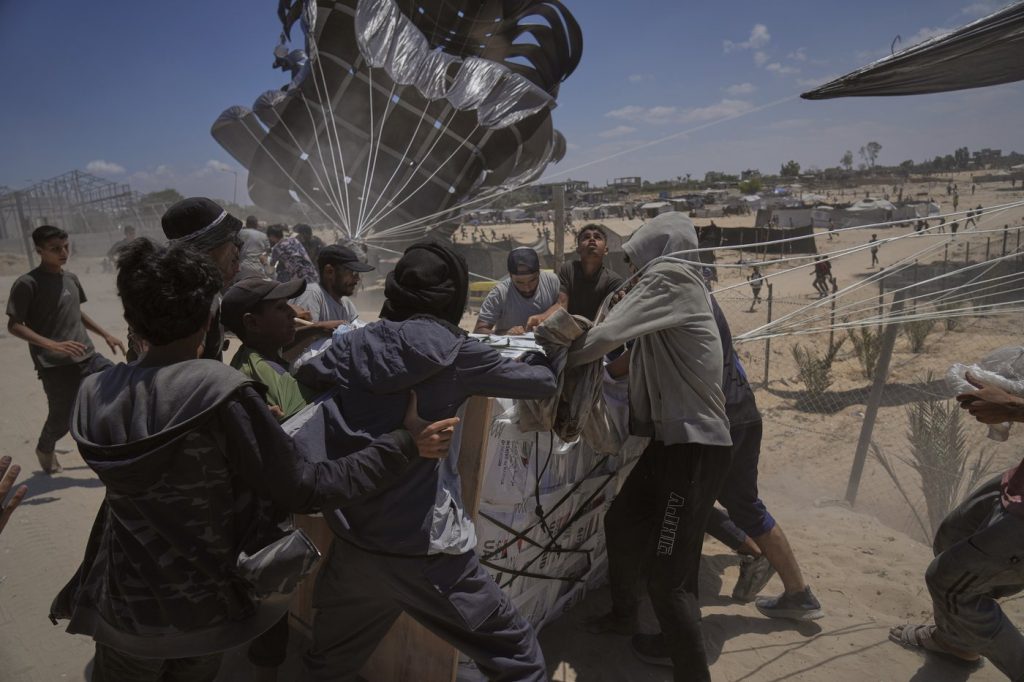JERUSALEM (AP) — Israeli Prime Minister Benjamin Netanyahu has signaled potential wider military operations in Gaza, as calls for an end to the prolonged conflict intensify from former army and intelligence leaders. Following nearly 22 months of ongoing war, Gaza’s Health Ministry reports that the Palestinian death toll has surpassed 61,000, exacerbated by new fatalities among desperate civilians seeking food at aid distribution points. Amid escalating desperation, Israel's body responsible for coordinating aid announced a new agreement with local merchants aimed at improving the flow of humanitarian assistance.
Among the voices urging an end to the violence are former heads of Israel’s Shin Bet internal security service, Mossad spy agency, and the military, alongside ex-Prime Minister Ehud Barak. In a recent video circulating on social media, they accused far-right government officials of holding the country “hostage” by prolonging the war. Yoram Cohen, former Shin Bet chief, dismissed Netanyahu’s war objectives as “a fantasy,” arguing the complexity of reaching every militant and simultaneously securing the return of hostages is unfeasible.
As Netanyahu convened his Security Cabinet to discuss future military plans, speculation arose regarding the potential for tougher military action in Gaza. However, the meeting concluded without any definitive announcements, leading to reports of disagreements between Netanyahu and army chief Lt. Gen. Eyal Zamir over strategic direction. While Netanyahu allegedly urged the military to conquer all of Gaza, risking further hostages and humanitarian crises, Zamir reportedly opposes such a drastic step.
In the meantime, violence continued to escalate in Gaza, where Israeli forces reportedly opened fire on Palestinians seeking aid on Tuesday morning, resulting in at least 45 casualties. Among the dead were 26 individuals in the Morag Corridor, where desperate looters engaged with U.N. aid convoys. Eyewitness accounts reveal a chaotic scene where people clamored for scarce resources, with some risking their lives amid gunfire as they sought to retrieve essential aid supplies.
Local health officials from Gaza confirmed that the bodies of six Palestinians were received at Al-Awda hospital after being targeted by Israeli troops near another aid distribution site. Claims by the Israeli military that they only fired warning shots during previous incidents have been met with skepticism by witnesses and local sources. The ongoing conflict has made it increasingly difficult to deliver essential aid, with reports documenting hundreds of Palestinian deaths as civilians attempt to reach food distribution sites and humanitarian resources.
The Israeli defense organization, COGAT, announced plans for a gradual renewal of goods entry through the private sector in Gaza. Limited local merchants have been approved for this initiative, yet aid groups criticize these measures as insufficient to meet the dire needs of the population.
Desperation is palpable among the Palestinian populace; many families, such as that of Mohammed Qassas from Khan Younis, report being forced to storm aid trucks amidst life-threatening conditions. Individuals feel that survival hinges on engaging in chaos to secure food and basic necessities, which underscores the intensity of the humanitarian crisis compounded by Israel's military blockade and offensive tactics.
As international observers watch closely, funerals become a daily occurrence in Gaza. Families express outrage and tears over the unbearable pain of losing loved ones amid the ongoing conflict. Eyewitness accounts capture the heart-wrenching reality faced by those in Gaza, who articulate their struggles and implore the world to recognize their plight.
Shurafa reported from Deir Al-Balah, Gaza Strip, with contributions from Associated Press writer Josef Federman in Jerusalem.












